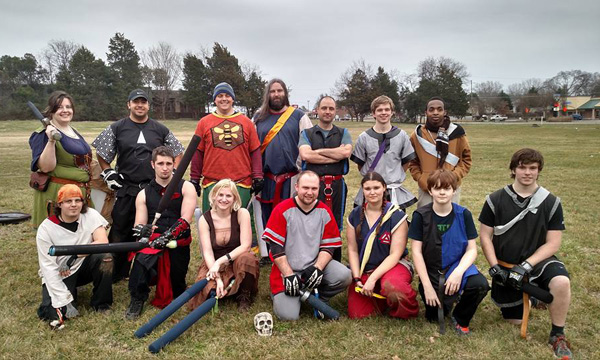
A frost giant rampages through Old Fort Park on a Saturday afternoon. With fierce roars he shambles forward, swinging his club and knocking down structures. All that stands between him and total destruction is a small band of fighters; they circle ’round him, their swords ineffective against the sturdy giant until they are able to stun him temporarily with a series of blows to the back. Meanwhile, a few swift-footed individuals gather up talismans scattered among the woods until they are able to summon forth two immortal warriors with a bard’s chant. These two warriors make swift work of the giant—but then their hungering eyes and swords turn upon those who have summoned them.
When all is done, the giant, the immortal warriors and the band of fighters alike gather to replenish themselves and laugh about the day’s battle. They lay down their foam-clad weapons and shields—designed to meet strict safety regulations according to the rules of the organization they are a part of, known as Amtgard—and loosen their handcrafted belts. Member Steve Owens, whose Amtgard fantasy persona is the scout Delcion, says, “What better way to enjoy a Saturday afternoon than to be out in the sunshine, with fun folks, hitting each other with foam?” They have just played out a “battlegame,” one type of game played during their weekly gathering, where players take on a character name and a specific role—such as mage (magician), assassin, healer or barbarian—and use skill sets unique to that class.
Other types of games include “ditching”—in which two lines of fighters face each other until one team wins—and various “militia” games that have specific objectives but do not incorporate class rules. Jessica Horton, who in her “mundane life” serves as a Siegel High School English teacher, enjoys battlegames the most.
“When playing, I enjoy class and militia games where special game rules level the playing ground, so less aggressive fighters like me can square up against more experienced fighters and still have a chance of winning,” she says.
Amtgard is a global live-action roleplaying (LARP) organization, with regional hierarchies (kingdoms and principalities) that in turn oversee local groups (shires, baronies, dutchies) such as the Shire of Emerald Academy, which makes Murfreesboro’s Old Fort Park its home every Saturday starting around 1 p.m. and ending when everyone is tired. Horton’s husband, John, who typically plays a barbarian named Walberan, still remembers starting Amtgard when he was in college.
“My first day was very exciting. . . . I remember my first weapons were a spear and a huge shield,” he says. “I fancied myself a Spartan.”
The overall theme of the game is medieval fantasy, but players are free to embody anything from a caveman to a Victorian-era “steampunk” genre character.
The game is not just about fighting, though. Amtgard also offers leadership opportunities and ways to learn real-life skills. Each local group, or “park,” has bi-annual elections for its officers: a monarch, a chancellor to manage record-keeping and finances, a champion to direct games and a regent to promote the arts and sciences. Large gatherings on the regional level offer other opportunities for learning how to coordinate and help with events.
“I have had many experiences working in a kitchen preparing a meal for 60 or more people,” says Jessica Horton. “I wouldn’t have been exposed to any of this if not for Amtgard.”
At these larger-group events, local and regional officers distribute awards to players, recognizing them for accomplishments in different areas including leadership, service, battlefield honor and the arts.
While some people particularly enjoy the fighting and leadership aspects of the game, others also enjoy crafting, which consists of making game items, weapons, clothing and accessories, among other things. Anthony Brown, aka Loric Al’Delnar, says, “I have learned a lot of craft skills from being involved with Amtgard, things like leatherworking, woodworking, sculpting and painting.”
Brown, who hails from Spring Hill, is well known in the Principality of Winter’s Edge (the region consisting of Tennessee and most of the Southeastern U.S., minus Florida) for his exceptional leatherworking, and even taught a leatherworking class at an Arts and Sciences Symposium in February. Crafters are always willing to share their knowledge, and often make items for other players.
Sydney Willis of Nashville, who has been LARPing for about two years and enjoys cooking feasts and playing with a bow and padded arrows, has found that Amtgard benefits her in many ways.
“On a personal level I get much more than I ever expected out of Amtgard. You have the fighting and physical aspect that keeps you in constant motion and also improves your reaction time, endurance and strength. The crafting side of Amtgard has inspired me to push myself creatively and to take pride in whatever I make,” she says. “On a deeper level Amtgard has helped me tremendously with my PTSD, anxiety and depression issues; I’ve come out of my shell and been more social.”
The social aspect provided by shared interests and goals is something Anthony Brown appreciates the most.
“The main thing that I have gotten out of Amtgard is lifelong friends,” he says. He began playing at the age of 14 in Texas, took several years off to start a family, and has returned to the game 27 years later. “I am still friends with many of the people that I met when I first started playing. Amtgard has also enabled me to find many new friends after moving cross-country to Tennessee.”
He has also brought his 12-year-old son, Xander, into the game; although players are generally required to be 14 or older to play, Xander, who is also a Boy Scout and has a red belt in Taekwondo, has been granted special permission to play.
Jessica Horton has had to step back from fighting while carrying twins, but she still attends weekly as the park’s chancellor. She also brings her 3-year-old son each week.
“Emerald Academy is a very supportive, family-friendly group that fosters growth by helping players old and new explore various aspects of the game until everyone finds their niche with the organization,” she says. And, adds Sydney Willis, “Emerald Academy was the first of several parks to make me feel at home and like part of a family.”
The members of Emerald Academy have a lot to offer, and the group welcomes new players. You can find Emerald Academy Amtgard on Facebook, or just show up at Old Fort Park on a Saturday afternoon, look for the strangely dressed people near the pavilions past the tennis courts, say hello and pick up a sword, and you just may find yourself with an exciting new hobby.



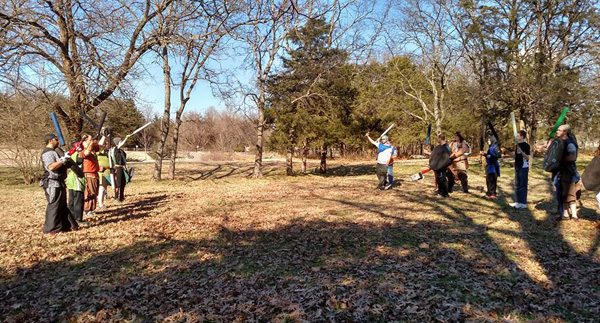
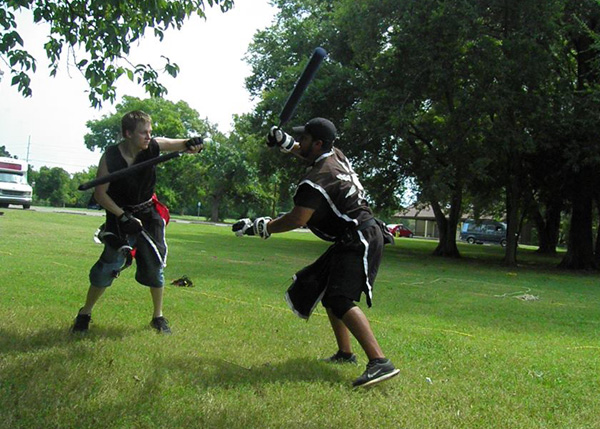
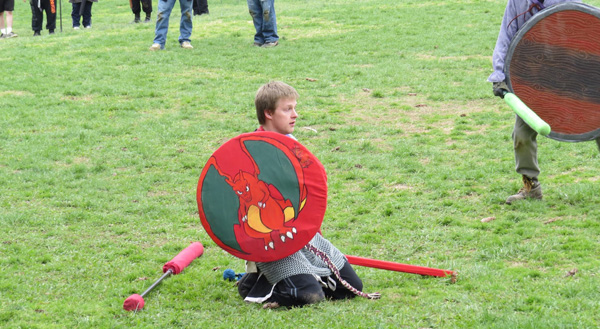
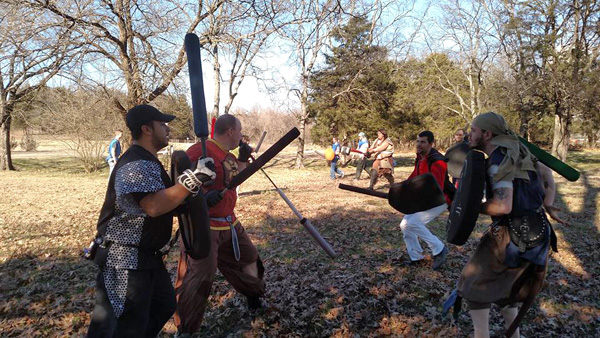
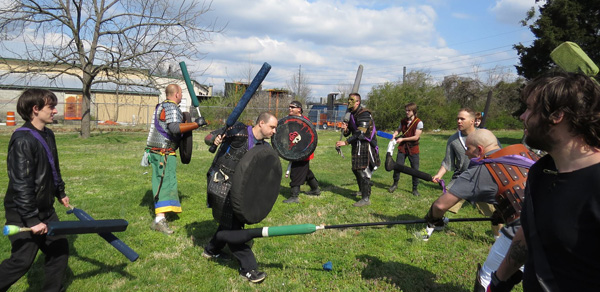











Just when I thought the world was turning gay, I read this article and my faith in the human race has been renewed.
Comment April 29, 2016 @ 9:40 am